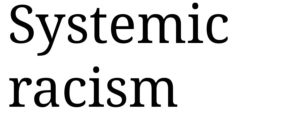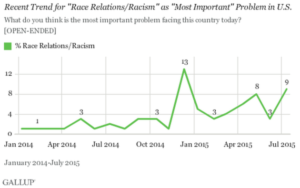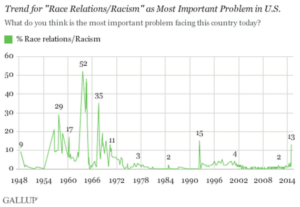
In the most recent poll, only the economy and dissatisfaction with the government—13 percent each—were rated higher than racism. However, to put things in perspective, during the Civil Rights Movement of the 1960s, as many as 52 percent of Americans believed racism was the most important issue facing the country. Further, more people of color tend to believe race relations is the nation’s foremost problem. In December 2014, 22 percent of people of color held this position, compared to 9 percent of whites.


The problem is that many people, particularly whites, view racism as the acts of individual racists such as Dylann Roof, or a brutal white police officer, rather than identifying racism as a system of oppression in which whites—all whites—benefit at the expense of Blacks.
“White supremacy is the operationalized form of racism in the United States and throughout the Western world. Racism is like the generic product name, while white supremacy is the leading brand, with far and away the greatest market share,” writes Tim Wise, an antiracism educator, author and essayist who is white. “While other forms of racism could exist at various times and in various places, none have ever been as effective and widespread in their impact as white supremacy, nor is it likely that any such systems might develop in the foreseeable future,” Wise explains.
According to Wise, white privilege is defined as “any advantage, opportunity, benefit, head start, or general protection from negative societal mistreatment, which persons deemed white will typically enjoy, but which others will generally not enjoy.”
Wise adds that the benefits of white privilege can be material, including the ability of whites to accumulate more wealth than people of color over the centuries; social, such as presumptions that whites are intelligent; or psychological, including living free of worries about racial profiling. He notes that white privilege is the flipside of discrimination against people of color, as whites are receiving a benefit of more opportunity specifically because Black and Brown folks are getting less. White privilege “still exists as a daily reality throughout the social, political and economic structure of the United States,” and exacts a huge toll on society and hurts us all in the end, Wise concludes.
There are efforts to change these attitudes and begin a conversation on white skin privilege and white supremacy. For example, as was reported in Time magazine, MTV launched an online and on-air campaign last year called “Look Different,” which is designed to expose and eliminate the more insidious types of prejudice that fall under the radar and evade detection. In one of the campaign’s satirical ads called “White Squad,” a “white advantage service” company staffed with Caucasians helps people of color deal with “racially unbalanced” situations such as appearing in court, hailing a cab or looking for an apartment.
Further, there is the Whiteness Project, a film project in which filmmaker Whitney Dow—who is white—records groups of white people discussing their opinions on what it is like to be white in an increasingly diverse nation. For years, he has collaborated with Marco Williams, who is Black, on film projects related to race. Dow told NPR that he wants to travel around the country and make videos of 1,000 white Americans discussing race, hoping the conversation continues away from the camera. He views this as a first step in helping whites understand the connection between race and privilege. “I think it would be interesting for people to look at it and examine why perhaps some of those things that they may even agree with or wrestle with, why it makes them so uncomfortable,” he said.
Ultimately, the Pew poll is encouraging in that more people are thinking about racism as an ongoing problem, if not the most pressing issue facing the “land of the free.” However, the results show that much more work must be done to help Americans understand the ubiquitous nature of white skin privilege and white supremacy in daily life.


